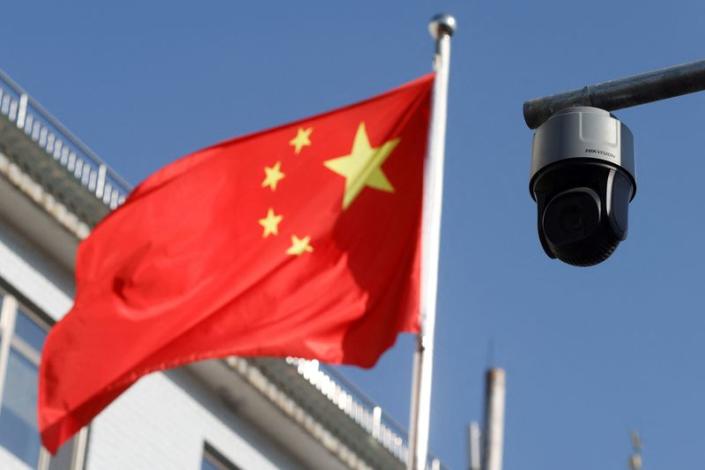Foreign business chambers have voiced concern over China’s increasing use of bans that stop people from leaving the country.
Scores of Chinese and foreigners have been ensnared by exit bans, according to a new report by the rights group Safeguard Defenders, while Reuters says an analysis has found an apparent surge of court cases involving such bans in recent years.
One person prevented from leaving China this year is a Singaporean executive at the US due-diligence firm Mintz Group, after a raid in March that led to its Beijing office being shut down, according to three people familiar with the matter.
The company, the executive and China’s Public Security Bureau did not respond to requests for comment. But Mintz said in late March the authorities had raided the firm’s China office and detained five local staff. The foreign ministry said at the time Mintz was suspected of engaging in unlawful business operations.
Raids on other firms, such as Bain & Co‘s office in Shanghai, and news of expanded powers under China’s new anti-espionage law are seriously undermining claims by the authorities that the country is open for business after three years of tight Covid restrictions.
ALSO SEE:
China Seeking Ways to Take Out or Control Enemy Satellites
Big jump in court cases mentioning exit bans
The Safeguard Defenders group says China is increasingly using exit bans, or confiscating people’s passports, to punish human rights defenders and their families.
It alleges that officials in the country use exit bans to “hold people hostage to force targets overseas to come back to China (a practice called persuade to return, a form of transnational repression), control ethnic-religious groups, engage in hostage diplomacy and intimidate foreign journalists.”
Its report says: “Since Xi Jinping took power in 2012, China has expanded the legal landscape for exit bans and increasingly used them, sometimes outside legal justification.
“Between 2018 and July of this year, no less than five new or amended (Chinese) laws provide for the use of exit bans, for a total today of 15 laws,” Laura Harth, the group’s campaign director, said.
The group estimates “tens of thousands” of Chinese are banned from exit at any one time. It also cites a 2022 academic paper by Chris Carr and Jack Wroldsen that found 128 cases of foreigners being exit-banned between 1995 and 2019, including 29 Americans and 44 Canadians.
Attention on the exit bans comes as China-US tensions have risen over trade and security disputes. This contrasts with China’s message that it is opening up to overseas investment and travel, emerging from the isolation of some of the world’s tightest Covid curbs.
The analysis of records on exit bans, from China’s Supreme Court database, shows an eight-fold increase in cases mentioning bans between 2016 and 2022.
China last week beefed up its counter-espionage law, allowing exit bans to be imposed on anyone, Chinese or foreign, who is under investigation.
Most of the cases in the database referring to exit bans are civil, not criminal. Reuters did not find any involving foreigners or politically sensitive subversion or national security issues.
By comparison, the US and European Union impose travel bans on some criminal suspects but generally not for civil claims.
Raids raise questions on due diligence work
China’s Ministry of Public Security did not respond to requests for comment on exit bans, including inquiries on how many individuals, including foreigners, are subject to them.
Police also visited Bain & Co’s office in Shanghai and questioned staff, the US management consultancy said last week.
“Because of rising tensions between the US and China, the salience of this (exit ban) risk has risen,” Lester Ross, a veteran lawyer in China who has handled exit ban cases, said.
“I’ve seen a rise in companies and entities being concerned about this and asking for our advice on how to prepare and reduce risks” of exit bans, Ross, the head of the American Chamber of Commerce’s China policy committee, said.
‘Uncertainty is huge’
Foreign businesses are concerned about the heightened scrutiny and the vague wording of the counter-espionage legislation, which says exit bans can be imposed on those who cause “harm to the national security or significant damage to national interests”.
“The uncertainty is huge,” Jorg Wuttke, head of the European Union Chamber of Commerce in China, said. “Can you do due diligence? Clarity has to come.”
The EU chamber said in a statement: “At a time when China is proactively trying to restore business confidence to attract foreign investment, the exit bans send a very mixed signal.”
People barred from leaving China include regular Chinese embroiled in financial disputes as well as rights defenders, activists and lawyers, and ethnic minorities such as Uyghurs in China’s northwestern Xinjiang region, according to the Safeguard Defenders report.
It cites a Chinese judicial report saying 34,000 people were placed under exit bans between 2016 and 2018 for owing money, a 55% rise from the same period three years earlier.
Some activists say the wider use of exit bans reflects tighter security measures under President Xi.
“They can find any reason to stop you from leaving the country,” said Xiang Li, a Chinese rights activist who was denied exit for two years before escaping from China in 2017 and later receiving asylum in the United States.
“China doesn’t have the rule of law,” she said by phone from California. “The law is used to serve the purposes of the Chinese Communist Party. It’s very effective.”
- Reuters with additional editing by Jim Pollard
NOTE: Further details were added to this report on May 2, 2023.
ALSO SEE:
Micron Probe Fuels Fears of US Businesses in China
South Korea Asked Not to Fill Chip Gap if China Bans Micron
China Raids Office of US Due Diligence Firm, Detains Staff
China Slaps Deloitte With $31m Fine Over Huarong Audit
Top China Dealmaker Bao Fan Disappears
China Cybersecurity Rules Seen as Big Risk For Finance Firms
























